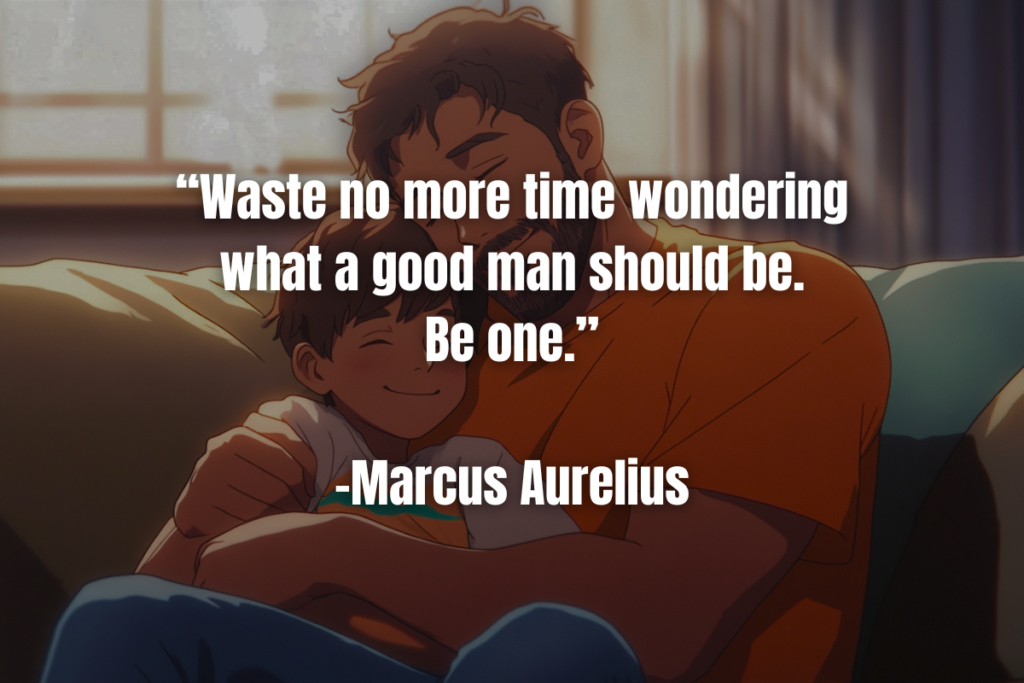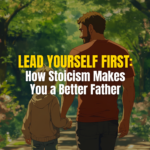Introduction
I didn’t grow up hearing about stoicism. Honestly, it wasn’t until I became a father that I realized how much I needed it.
Being a dad has brought out both the best and the most reactive parts of me. And somewhere between sleepless nights, emotional blow-ups, and the quiet pressure to keep it all together, I started looking for a better way to show up.
That’s when I found stoic philosophy. Not as some cold, emotionless way to live. But as a practical, everyday guide for being the calm in the storm.
I’ve found the more times I lean into this way of thinking, the easier I can approach situations with my kids, or wife and come out with a clearer head.
In this post, I want to share why I believe stoicism and fatherhood go hand in hand—and why every dad today can benefit from it.
What Is Stoicism, Really?
Most people hear “stoic” and think emotionless or detached. But real Stoic philosophy is the opposite. It’s about feeling everything, and still choosing your response.
Stoicism started in ancient Greece and Rome, with thinkers like Marcus Aurelius, Epictetus, and Seneca. But it’s not just history—it’s a toolkit.
The core values of stoicism are:
- Self-control
- Acceptance of what you can’t control
- Reflection and intention
- Living in alignment with your values
What hit home for me was this: you don’t have to be perfect—you just have to show up grounded. Stoicism helped me do that.
Why So Many Dads Are Struggling
If you’re anything like me, you probably grew up with the message: Don’t cry. Be tough. Don’t talk about your feelings.
But then you become a father—and your kids need emotional safety. They need presence. They need someone who knows how to regulate, not explode.
We’re under constant pressure: provide, protect, engage, succeed. All while trying not to fall apart.
I’ve had those moments where I snapped too fast. Where I scrolled instead of being present. Where I avoided the hard talks because I didn’t know what to say. We’ve all had those moments. Modern fatherhood is tough!
Fatherhood will test every part of you, and most of us never got the tools. We showed up with this beaufitul baby and no instruction manual. Realizing that old school tactics aren’t the way are a tough thing to adjust to.
That’s why stoicism matters. It gives us a roadmap.
Stoicism as a Toolkit for Dads
Here’s the truth: you can’t control your child’s emotions. But you can control how you respond to them.
That’s been the biggest shift for me. Instead of trying to force peace or obedience, I focus on staying steady. Letting my energy lead.
A few stoic practices that changed my approach:
1. The Power of the Pause
Before I react—especially when I’m tired or frustrated—I breathe. One breath. That’s it. It slows everything down and gives me a choice.
2. Morning Reflection
I take 2 minutes in the morning to ask: How do I want to show up today? Sometimes the answer is patient. Sometimes it’s fun. But I choose it before the chaos begins.
3. Evening Check-In
At the end of the day, I ask: Where did I show up well? Where could I improve? No shame. Just curiosity and growth.
These aren’t big, dramatic changes. But over time, they’ve reshaped my entire relationship with my kids—and with myself.
One of my favorite quotes from Epictetus says:
“Don’t explain your philosophy. Embody it.”
That’s fatherhood in one line.
3 Simple Stoic Habits to Start Today
If you’re new to this—or overwhelmed by it all—start small. Here are 3 daily habits I use and share with other dads:
1. The Morning Check-In
Before your feet hit the floor, ask: What kind of father do I want to be today? Visualize it for 30 seconds.
2. The One-Breath Rule
When emotions rise, take one breath before you speak. That pause might save a moment—or a memory.
3. The Daily Review
Each night, write down one win and one lesson. Just one. Build the habit of reflection.
It’s not about being stoic for your kids—it’s about being steady with them.
Conclusion: The Quiet Work That Changes Everything
Fatherhood isn’t loud. It’s not flashy. It’s small decisions, repeated daily. It’s choosing presence over perfection.
Stoicism helps me slow down, show up, and stay rooted—even when things get messy. Especially when they do.
If you’re a dad looking for a better way to lead your family—start here.
Lead yourself first. The rest follows.






